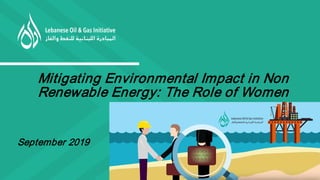Mitigating environmental impact in non renewable energy the role of women
- 1. Mitigating Environmental Impact in Non Renewable Energy: The Role of Women September 2019
- 2. “Women are actors and not victims It is time that they have a better way to engage with natural resources” Extracting Equality-Publish What You Pay
- 3. Global movements’ now focus on gender issues ● PWYP’s gender responsive Chain for Change: Extracting Equality-12 steps All citizens need to benefit from their natural resources. Therefore, ALL citizens need to be involved in governing their natural resources. Step 3 of the chain: Looking at the environmental impacts of extraction: Has impact assessments been carried out by a team that has equal gender representation? Have women been consulted and participated in impact assessments? Have all community members been informed of the results? Are the consequences on women fully understood? ● PWYP’s approach to building coalitions: A gender balanced approach
- 4. Global movements’ now focus on gender issues ● The Extractive Industry Transparency Initiative- EITI and its new gender requirements: • MSGs are required to consider gender balance (#1.4). • EITI reporting should provide em ploym ent figures by project, role and gender where available (# 6.3). • MSGs should consider inform ation access challenges by gender and sub- groups (# 7.1). • MSGs are encouraged to docum ent efforts to im prove gender equality and social inclusion (# 7.4).
- 5. Lebanon: Exploring for Oil and Gas Who is LOGI? The gender-imbalanced team of five: 4 to 1 LOGI’s first focus was on revision of the Strategic Environmental Assessment-SEA Regional workshops to explain the environmental impact and the need for SEA: Less women participation in the regions: Inability to commute, attend in the afternoons
- 6. LOGI’s focus on technical and vocational skills for the nonrenewable energy sector in Lebanon
- 7. 20 outreach sessions in 2018 LOGI’s 20 outreach sessions on technical and vocational skills needed to enter the non renewable energy sector job market: Eye-opening town hall meetings and school sessions Less female interest and participation in rural areas
- 8. Gender diversityintheenergysectorcan: Based on a study done by the Issam Fares Institute in 2018: 1. Generate more inclusive solutions to energy problems 2. Improve the sector’s reputation of being a “male dominant” field 3. Increase economic growth with both genders benefting from economic opportunities
- 9. Interesting facts about Women participation in Energy Studies in Lebanon 1. New energy majors are established pushed by the development of the renewable energy market and the emerging oil and gas sector in Lebanon 2. 8 Universities in Lebanon now offer 15 energy related degrees 3. Out of the 540 students enrolled, 68% are enrolled in petroleum and petrochemical programs, 20% are enrolled in renewable energy, 12% in general energy 4. There is better participation of women in renewable and general energy than in nonrenewable energy studies (engineering) 5. The majority of students enrolled in energy studies is found in Beirut and Mount Lebanon due to the geographic distribution of universities and tertiary education centers
- 10. Challenges and obstacles hindering female participation in energy studies 1. Shortages of energy studies offered in rural areas make it harder for females to participate since they encounter mobility and cost challenges. Rural women find it hard to study and live in Beirut. 2. Women have less appetite for the non-renewable energy studies since the petroleum sector is perceived as unstable, problematic, non-inclusive, and not transparent. 3. While women’s focus is on renewable studies (with greater female enrollment), their decreased interest in nonrenewable and technical and vocational related studies is making them lose future job opportunities in the developing oil and gas sector in Lebanon
- 11. So what do we need to do? 1. Develop and implement tailored educational policies that will enhance female participation (especially in rural areas) in energy studies, especially at the technical/vocational level. Expanding university presence and establishing tertiary educational centers in these areas is needed 2. Develop tailored approaches to include women in the governance of their natural resources: build gender-balanced coalitions, ensure women representation in multi-stakeholder engagements. 3. Promote gender-sensitive equal opportunity employment in the emerging energy sector in Lebanon
- 13. اﺮﺷﻜ @LOGI_Lebanon @logi_Lebanon @LOGI_Lebanon @logiLebanon @Lebanese Oil and Gas Initiative (LOGI) www.logi-Lebanon.org

